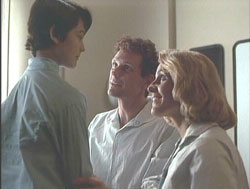Plot
Dickie Jordan is an intelligent and curious youth. He and his family live in a dystopian future. On Dickie's twelfth birthday, he is required by law to undergo an intelligence examination. Dickie's birthday wish is to do well on his exam. His parents appear stressed and avoid his questions. When the time comes, his father brings him to a government testing facility. There he is given a serum to ensure he tells the truth and given a series of intelligence assessment questions.
After the test is complete, Dickie's parents are contacted by the government and told that Dickie's intelligence exceeded the legal limit and so he was terminated. The parents burst into tears as the government examiners ask them how they would like to handle their son's remains: whether his body should be interred by the government, or if they would prefer a private burial.
This page is based on this
Wikipedia article Text is available under the
CC BY-SA 4.0 license; additional terms may apply.
Images, videos and audio are available under their respective licenses.
